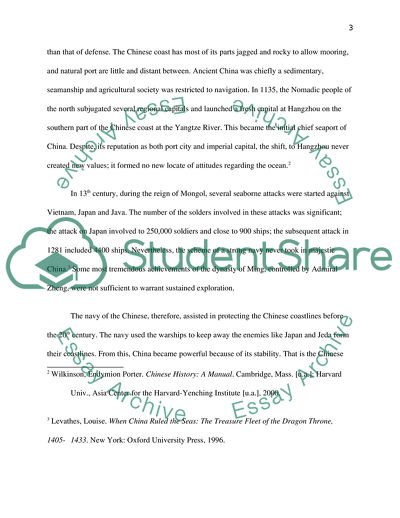Cite this document
(Roles of Chinese Navy and Maritime, and Ming Treasure Ship Voyages Report Example | Topics and Well Written Essays - 1500 words, n.d.)
Roles of Chinese Navy and Maritime, and Ming Treasure Ship Voyages Report Example | Topics and Well Written Essays - 1500 words. https://studentshare.org/history/1773447-the-role-of-the-chinese-navy-and-maritime-before-the-20th-century-with-an-emphasis-on-the-impact-of-the-ming-treasure-ship-voyages
Roles of Chinese Navy and Maritime, and Ming Treasure Ship Voyages Report Example | Topics and Well Written Essays - 1500 words. https://studentshare.org/history/1773447-the-role-of-the-chinese-navy-and-maritime-before-the-20th-century-with-an-emphasis-on-the-impact-of-the-ming-treasure-ship-voyages
(Roles of Chinese Navy and Maritime, and Ming Treasure Ship Voyages Report Example | Topics and Well Written Essays - 1500 Words)
Roles of Chinese Navy and Maritime, and Ming Treasure Ship Voyages Report Example | Topics and Well Written Essays - 1500 Words. https://studentshare.org/history/1773447-the-role-of-the-chinese-navy-and-maritime-before-the-20th-century-with-an-emphasis-on-the-impact-of-the-ming-treasure-ship-voyages.
Roles of Chinese Navy and Maritime, and Ming Treasure Ship Voyages Report Example | Topics and Well Written Essays - 1500 Words. https://studentshare.org/history/1773447-the-role-of-the-chinese-navy-and-maritime-before-the-20th-century-with-an-emphasis-on-the-impact-of-the-ming-treasure-ship-voyages.
“Roles of Chinese Navy and Maritime, and Ming Treasure Ship Voyages Report Example | Topics and Well Written Essays - 1500 Words”. https://studentshare.org/history/1773447-the-role-of-the-chinese-navy-and-maritime-before-the-20th-century-with-an-emphasis-on-the-impact-of-the-ming-treasure-ship-voyages.


